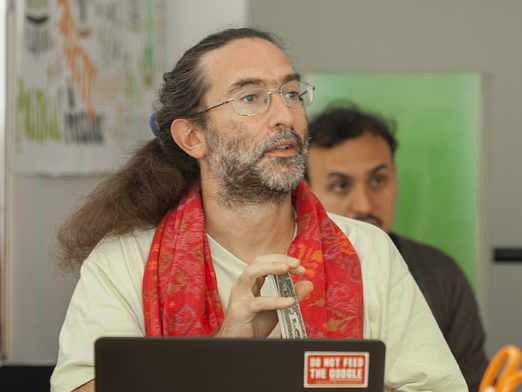Last time I described several solidarity economy networks and a bit about their software situation and needs. Today I want to look at some solutions which could help them work in a more integrated way.
This article starts from the specific problem of accounting, and widens out to whole-platform approaches.
For full interoperability the accounting needs to be abstracted out of the community portal into its own service, and made accessible with an API.
For me the most interesting accounting system is Ripple because it is open and has a web API allowing anyone to plugin and log transactions in arbitrary currencies. It also contains an automatic market between every possible currency pair, and distributes all records accross a blockchain.
Similarly, but much simpler is Openmoney is a pure multicurrency accounting platform with a web API so that any group or any currency can easily make use of it. While one wallet can hold many currencies, the software doesn't support buying and selling between currencies.
A new initiative this year, is Permacredits. With strong ties to the cryptocurrency community, Permacredits seeks to become a whole financial ecosystem for the ecological movement. A suite of accounting tools is in the works while legal work proceeds and partnerships built with investors who will buy Permacredits as a way of financing ecological enterprise.
Another blockchain project is Cyptonote, which allows communities to host their own currencies, with an important feature which allows anonymity.
Finally Open Transactions writes contracts and provides triple-signed signed receipts and has many financial tools built on it.
But accounting/finance is just one service in a whole suite needed by every community. Similarly, services like BlaBla car, Kickstarter provide one function and accrue very one-dimensional spread-out communities around them. How can we provide services to existing communities in a way that strengthens those healthy place-based real-world family and economic relationships that humans evolved with?
My own attempt, Hamlets is aimed at LETS & Timebanking groups and it can be extended with any functionality that Drupal can provide.
Simlilarly, CES, Community Weaver, hOurworld, & Cylcos all support the same kind of local economic/exchange relationships.
A new French project, Wezer, is building on Open ERP version 8 to make an extensible community platform and to emulate many essential organising tools like google docs, Loomio, Dropbox etc. as built-in integrated modular components. Bravo!
But this is still not enough. Any single software instance cannot scale for a whole movement, and will run into governance problems sooner or later. Communities need to both to manage their own software & data, and access globalised comprehensive public web services for daily life such as ridesharing, news aggregation, petitioning, staycations, marketplaces etc etc?
Why can't I advertise my spare room locally and globally with one posting? Global viewers should see my multidimensiona reputation score built up through my local non-hosting-related activities and should be able to pay with credit issued in their town.
But the reality is that I might advertise my surplus furniture on Freecyle and Streetbank and fail to sell it because when my neighbour is looking on NeighbourGoods and NextDoor. The logic of the free market will soon mean that all possible infrastructure data services will run by a government-partnered monopoly in Silicon Valley just as Facebook now dominates social networking.
At the moment neither the decentralised social networking platform exists, nor the global services which could plug into it. For the global solidarity economy will never be able to come together effectively, we need to rebuild the internet, folks!
Not from scratch though, we understand the requirements and have many prototypes to start from
- Facebook shows how, with a widely used platform with a published API, anyone can write apps to enhance interaction between between members.
- Diaspora, provided an architecture based around peer2peer 'pods' which held user data according to local privacy policies, and ran 3rd party applications.
- Ethereum (if and when it is ever launched) will be an open source application platform using a blockchain, which means it is encrypted, indelible and decentralised. However the programming language will be pretty low level so it will be lots of work to build the kinds of tools I'm talking about.
And here is a list for further research.
The right decentralised open source social networking platform would allow the solidarity economy to start to coagulate and reap the benefits of scale. But what should we do until then? Should we each choose a platform and build tools for it which will be very hard to join up? Should we reccommend our members use a different web service for every need?
What the networks can do right now, is work together to express requirements, identify technical partners, and collaborate on fundraising and volunteer management.

Comments2
Thanks: great article! Do you
Thanks: great article!
Do you know FairCoop? https://fair.coop/
What do you think about it?
We need some people to work on it...
Member for
17 years 10 monthsyes somehow Catalonia
yes somehow Catalonia Integral Cooperative didn't get a mention on this page but we're in touch. I won't be helping directly though.